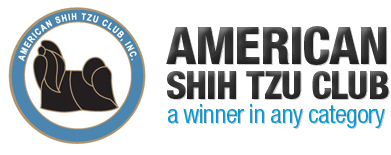Your Shih Tzu & Your Veterinarian
By Jo Ann White
As no individual can possibly be totally familiar with the quirks of every breed, here are some Shih Tzu peculiarities you might like to share with your veterinarian.
As no individual can possibly be totally familiar with the quirks of every breed, here are some Shih Tzu peculiarities you might like to share with your veterinarian.
1. Shih Tzu puppies often have slightly pinched nostrils that generally open with time. The bubbly discharge from a Shih Tzu puppy’s nose is NOT serious if the discharge is clear and watery and the dog is otherwise thriving. This problem is most acute during the teething stage. Even the nostrils of a dog that has difficulty simultaneously eating and breath-ing or is lethargic at this time may open satisfactorily as the dog matures, but a few dogs this severely affected may require surgery later on.
2. Small umbilical hernias (a bubble-like protrusion of fat at the navel through an opening no larger than the tip of your little finger) are common in Shih Tzu and are often due to excess stress on the umbilical cord during delivery. Such hernias often close naturally over time, although you may want to have them surgically closed while your pet is being neutered. Unlike inguinal (groin-area) hernias, they are not a reason to avoid breeding a dog.
3.Shih Tzu quite often cut their teeth relatively late and lose them relatively early. Undershot bites (lower jaw protruding beyond the upper one) are characteristic of this breed, and crowded, poorly aligned, and missing incisors are common.
4. Reverse sneezing describes a condition in which the dog seems to be unable to get its breath and begins to honk or snort. It is most often caused by a slightly elongated soft palate that “sticks” until the dog takes a deep breath through its mouth. The most effective way to stop this is to put a finger over the dog’s nostrils, thereby forcing it to breathe through its mouth. Sometimes just a hug and some reassurance will do the trick! Unlike more serious problems found in brachycephalic (short-faced) dogs, reverse sneezing in Shih Tzu is quite common and is not life-threatening.
5. Eye injuries are common in short-faced, large-eyed breeds, and require immediate veterinary attention. If your dog’s eye is red, or if it is squinting or pawing at one eye, take it to the vet at once.
